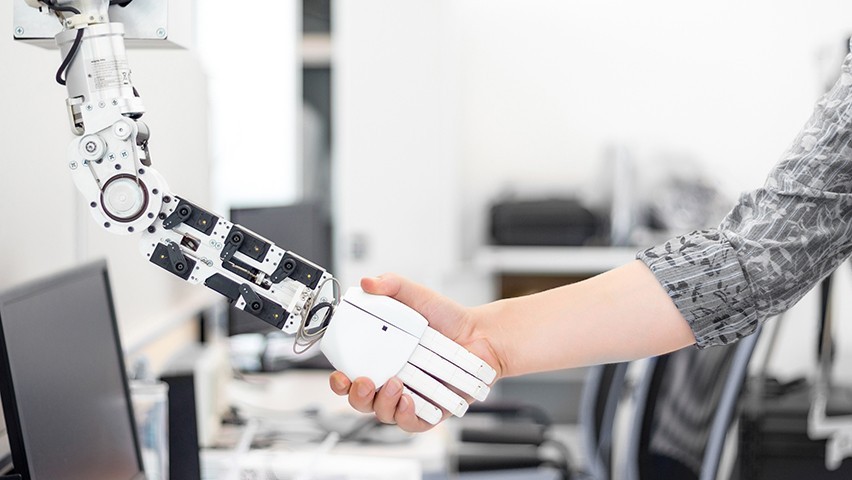Will AI Bring Fairness in The Workplace?

Image credit: The Economist
Yes, robots may take your job in the future. But for the time being, they are helping companies build better and more efficient workplaces.
It’s a relatively new practice that is in its early stages but the use of Artificial Intelligence (AI) could topple traditional office procedures and systems while helping your company figure out your pain points.
Indeed, when some of us think of AI, we can’t help but think about the endless possibilities it could render in the workplace. Machine learning, robotics, and more, are seeing breakthroughs every year. It is certainly exciting to think about where we could be by 2030.
However, the perceptions of AI and what it means for our jobs, has quite a few people worried.
Many are wary of AI and what it could mean for their livelihood and future.
Could it bring fairness or oppression in the workplace? What does it really mean for you and I?
Well…
Our Future is All About AI
What is AI?
From SIRI to self-driving cars, AI is anything from Google’s search algorithms to IBM’s Watson to autonomous robots. And it is developing quite rapidly.
AI today is known as “narrow AI” or “weak AI” in the sense that it is currently designed to perform narrow tasks like internet searches, driving and facial recognition.
But the long term goal of AI researchers, engineers and scientists alike is to great “strong AI.” Strong AI would outperform humans at every single cognitive task while weak AI only outperforms us in specific tasks.
Strong AI was merely thought of as science fiction or something that we are centuries away from achieving. However, there have been so many recent breakthroughs in getting there (that experts believed were decades away, only five years ago).
Many experts are now seriously considering the possibility of strong AI in our lifetime. So it is important for us to discuss the concerns, particularly those regarding safety, now.
That is why scientists and entrepreneurs like Stephen Hawking, Elon Musk, Steve Wozniak, Bill Gates and others have penned open letters expressing concern about AI.
That concern has also spurred many areas of research into the safety of AI for our society; from economics to law to verification, validity, security and control perspectives.
Since strong AI has the potential to be more intelligent than the smartest of us all, we have no way of knowing how it will behave. And the unfortunate part of it all is that we cannot use past technological advancements as a basis since such a technology that can outsmart us has never been created before.
Perhaps the best example we can use is our own evolution? We control the planet because we are the smartest. So if we are no longer the smartest, how can we remain in control?
Maybe we shouldn’t worry about those questions?
Image credit: The Atlantic
Most researchers believe that strong AI is unlikely to demonstrate human characteristics and emotions like love or hate and that there is no cause for us to be worried that robots will become involuntarily compassionate or malicious.A lot of research on AI points to the many benefits it could have in the workplace, specifically that it could make the workplace a fairer place for us all. So maybe that is what we should look at now.
Here are some of the ways AI could either bring fairness or oppression in the workplace.
AI Could Increase Productivity or Create an Orwellian Society
The first and most widely documented aspect of AI is that it could make a great impact on our productivity.
Ricoh Europe reports that 65 percent of European workers believe that AI and machine learning helps them to be way more productive. That is because it reduces repetitive tasks and helps them to access better quality data.
Productivity is particularly important because maximizing productivity levels determines the level at which a business is operating at, as well as its effectiveness. But what ethical prices are businesses willing to pay to become more productive?
Some have decided to use surveillance to track employee productivity.
You can argue that surveillance in the workplace is not an effect of AI. Factory workers clock in and out of work and managers already know what sluggish employees do on their computers.
But AI makes surveillance valuable. For example, companies like Veriato are monitoring keystrokes that employees make on their computers, so as to estimate how committed they are to their work.
Some companies monitor how much time employees spend on their breaks while some firms use AI to look through employee’s social media profiles.
And it all appears to be within their legal rights.
We may be uncomfortable with those practices, especially when our private lives are made public. However, there are very few laws that regulate how data should be collected at work and many employees unknowing consent to surveillance in their contracts.
To make the workplace fairer and less intrusive, employees should be made aware of what surveillance or tracking technologies are used in the workplace and what data is being collected.
Employees should also be able to request their own data so they can fairly and legally contest a dismissal; or if they choose to use the data as proof of their abilities to future employers.
AI Could Make Us More Efficient and Unemploy Us in the Process
Efficiency is closely linked to productivity but is also a measure of the quality of your work.
So while best AI software makes us more productive in minimizing the quantity of our work, it also makes us more efficient in maximizing the quality of our work.
Think about it this way: if you are spending less time on low-level tasks, then you can spend more time on things that necessitate critical thinking and adding value to your company.
And many companies like Amazon are using AI (in questionable ways) to increase efficiency.
Humanyze, a software company, syncs data from its badges with employee calendars and emails to calculate whether current office layouts work well for the team. All in an effort to increase efficiency, communication and collaboration in the workplace.
Slack, a team messaging app, helps managers to figure out how quickly employees are executing their tasks; so they can know when employees are sleeping on the job or misbehaving.
Amazon has patented a wristband that tracks the hand movements of warehouse workers and emits vibrations to make them more efficient.
Those uses of AI seem to be all well and good for a company, but are they beneficial for employees?
Maybe not.
Image credit: TechCrunch
Robots are increasing the efficiency of many businesses but are also increasing the unemployment rate. Because of them, human labor is not required in many factories and manufacturing plants.
True, robots are active and do not get tired, so they help reduce absenteeism, particularly in the industrial and manufacturing sectors.
However, humans are more efficient than robots when it comes to decision making, brainstorming, dealing with difficult situations and bringing emotion and empathy into the workplace.
AI Drives Innovation
With AI making us more productive and efficient, it would also enable us to spend more time on tasks that need more critical and innovative thinking.
If AI can do the data analysis that you don’t like to do, in 5 minutes or less, and also spot opportunities and trends for you, then you can better apply your abilities to that data.
It could encourage you to apply your mind and creativity to those tasks or results. That means that you would be able to operate at a much higher level than you currently are now.
AI Could Improve Customer Service
Every organization that depends on providing customer service sees some opportunity in AI. The ability to improve customer service while lowering costs is especially intriguing.
You most likely use Chatbots, perhaps even Slack, for customer service. And you would likely be doing that at a higher level once the technology exists to further deploy customer service data and natural language processing to provide personal customer service.
AI-based customer service is indeed quite inevitable. It is a service that can operate 24/7, build relationships and never makes customers wait.
And AI could be beneficial to employees as well.
Some employees like to get feedback on how they are doing and performing. A startup called Cogito has designed AI software that listens in on customer service calls and issues empathy scores based on how empathetic agents are and how efficient they are at resolving customer issues.
AI Could Help Create Better Managers
AI can help to accurately and fairly reward employees that perform well by dictating who gets a pay raise or promotion.
Image credit: Quartz
That begins with the hiring process.
People can be biased in hiring but if algorithms are designed properly, they can be more fair. Textio is a startup that uses AI to improve job descriptions and found that women are more likely to apply to jobs that mention “developing” a team rather than “managing” one.
Algorithms can also pick up pay discrepancies between genders and races along with sexual harassment and racism that managers can sometimes overlook.
That is not to say that algorithms are not free of the biases of their programmers. For example, the length of a commute could flag that an employee is more likely to quit their jobs but that could simply be because they either live further away or are old and walk more slowly than younger employees. So they could lose their jobs if all AI is doing is looking for productivity.
AI can also bring analytics to areas where managers are using their gut feelings to make important decisions.
Using employee data, AI can tell managers what motivates or demotivates employees. It can specifically give a company deep analytics on why employees are leaving so that they can bring hidden problem areas to light in order to address them. Whether it is bad management, lack of diversity, poor training, boredom or a toxic work environment.
AI has become very precise to the point that it can even detect whether someone is likely to leave a company.
Image credit: Inc.
Employers can then use that data to make policy changes that improve the workplace. And if data is collected over a long period of time, it can be used to predict potential problems before they actualize.
AI Could Save Businesses Money but Could Also Cost Them $$$
AI that helps to increase your productivity, efficiency, innovation and to build better leaders could save your business money.
Some businesses are even using AI for further costs savings by using software that screens for anomalies in expense claims; and flags receipts from odd hours of the night.
However, if your business relies on too many robots, it may suffer. AI still costs more than humans so it may not be beneficial in getting returns on investment.
Consider also that robots are not yet more intelligent than humans so they cannot improve their jobs outside of their programming. They still need manual labor for them to function. So training employees to manage them is a cost.
Furthermore, they operate on the information fed to them so if something goes wrong, your entire business could be at risk.
AI can save time but it can also create lags. It is a machine at the end of the day so you can’t expect too much from it: if it malfunctions, you will need extra time to fix and reprogram it (which costs money).
Perhaps more important, robots do not have feelings or emotions so putting them in the workplace would create an emotionless and unempathetic space.
Image credit: Quartz
AI Could Make the Workplace Safer
Robots are stronger and faster than humans; come in various shapes and sizes; and can work in any environmental condition, so they can be used in places where human safety is a big concern.
They are programmed by humans so they cannot say no to anything that can be dangerous or unwanted work that humans don’t want to perform. That is why they are being used in warfare and to clear up chemical spills in nuclear plants.
They are saving lives in that sense.
Image credit: Digital Trends
AI can also be used to see whether employees are wearing safety gear and that no one is injured in the factory. They save lives in that sense also.
But they could pose health risks for us.
If robots end up doing all the work, humans will just have to sit and monitor them. That could potentially lead to health hazards like obesity.
Those are the main points in the debate of whether AI will bring fairness or oppression in the workplace.
But what do actual employees think?
Engaging Opportunity: Working Smarter with AI
A research study was recently conducted by The Workforce Institute at Kronos and Coleman Parkes Research on employee attitudes about their workplaces and their overall experiences at work.
They were able to get clear and detailed insights about managers, technology and perspectives on how AI will likely impact jobs.
The study, "Engaging Opportunity: Working Smarter with AI," includes surveys of 3,000 employees across eight countries (Canada, Australia, the United States, New Zealand, Mexico, France, Germany and the United Kingdom).
It was found that 80 percent of workers see potential benefits of AI in improving their workplace experiences, while some had concerns due to a lack a transparency about strategy and poor communication from their leaders.
Here are some detailed stats from the survey:
Employees around the world are ready to embrace AI to make their work easier and fairer. 64 percent of employees from all eight countries say they would embrace AI if it is able to automate laborious internal processes and if it helped to balance their workload.
62 percent said they would embrace it if it increased fairness in subjective judgements while 57 percent said they would welcome AI if it helps managers make more sound decisions that affect individual employees.
There were varying levels of AI keenness per country. Employees in Mexico are more keen on AI’s benefits and Canadians and Americans are also ready to embrace AI.
French and German employees were less keen on AI.
Employers and employees are not communicating on the potential effects of AI on the workforce. The survey reports that 58 percent of international organizations haven’t discussed the possible impact of AI on their workforce with employees.
While 61 percent of global employees say they would be more comfortable if employers were more transparent about the impact AI would have on their workforce.
67 percent of US employees reported that they have no idea of their company’s plans for AI; while 66 percent of Canadians and 62 percent of Britons surveyed are unsure of what their company’s plans are.
Whereas, 66 percent of surveyed employees in Mexico say that their employers have openly discussed AI with them.
Transparency varies by industry. In the US, some industries are more transparent with their employees about the potential impact of AI on their workforce.
Organizations in finance/banking, manufacturing and logistics/transportation are discussing the future impact of AI with their employees. The same goes for Canada.
There were also differences in opinion between generations. 88 percent of surveyed Gen Z employees believe that AI could improve their job in some way while 70 percent of baby boomers feel that way.
Gen Z employees in the US feel that the biggest impact of AI will be to create a more fair working environment and those in Canada believe that it will bring more fairness to performance reviews.
Older millennials, younger millennials and Gen X employees in the US and Canada believe that the biggest benefit of AI would be the eradication of manual processes and time wasted on standard administrative work (which undermines rewarding workplace activities).
38 percent of baby boomers in the US don’t think, or are not sure of how AI would improve their jobs.
Globally, 82 percent of surveyed employees think AI will improve their jobs while 34 percent are concerned that AI could replace their jobs.
Joyce Maroney of The Workforce Institute at Kronos said, “organizations are making significant investments in benefits, technology, and innovative workplaces, yet employees are working more than ever and engagement has remained stagnant for decades.”
“While emerging technologies always generate uncertainty, this survey shows employees worldwide share a cautious optimism that artificial intelligence is a promising tool that could pave the way for a game-changing employee experience if it is used to add fairness and eliminate low-value workplace processes and tasks, allowing employees to focus on the parts of their roles that really matter.”
Guess we may just have to wait and see.
Wrapping Up
The term artificial intelligence is still quite a scary term for a lot of us. But it helps to think of it, for now, as a technology that enables us to parse through data in a way that we can’t.
Resisting it in the workplace could be costly. Imagine if any coach were to refuse to use data to make his or her team better and instead insists on going with their gut instincts. That resistance could see their team at the bottom of the league.
Whether or not you believe AI brings fairness or oppression in the workplace, you cannot resist using it as a tool to improve your workplace performance, efficiency and general operations.
All we need to do is find a delicate balance between performance and privacy on our journey with AI. We should not allow it to chain or dehumanize us in the workplace.




